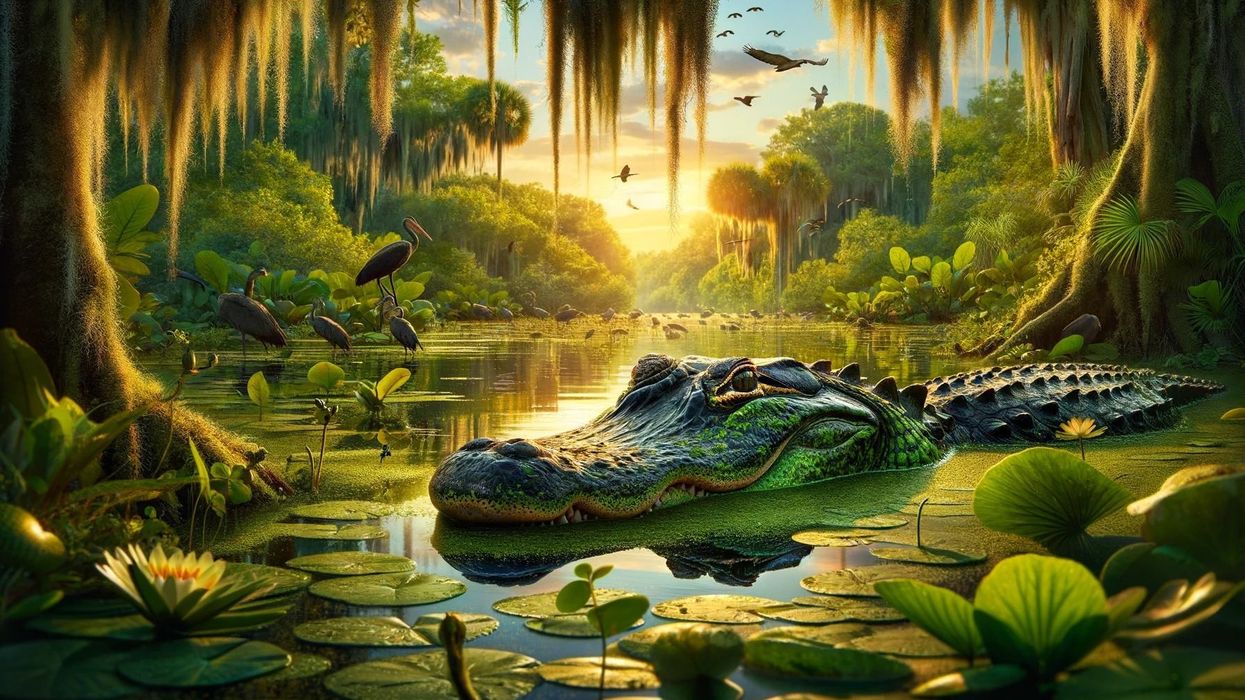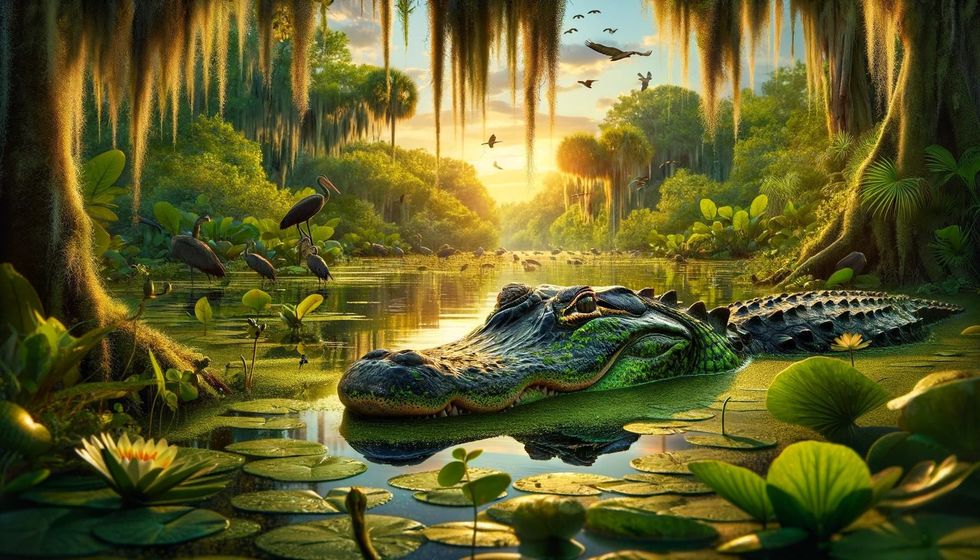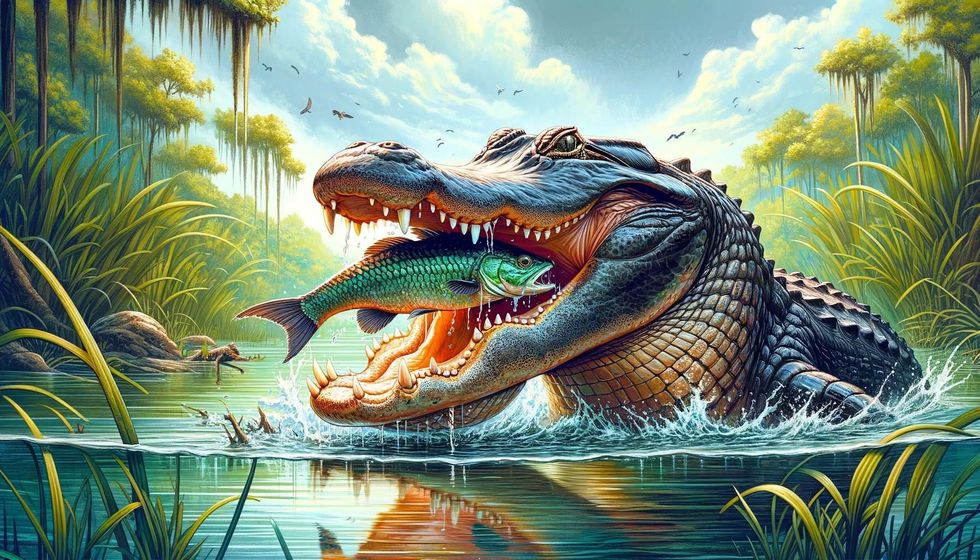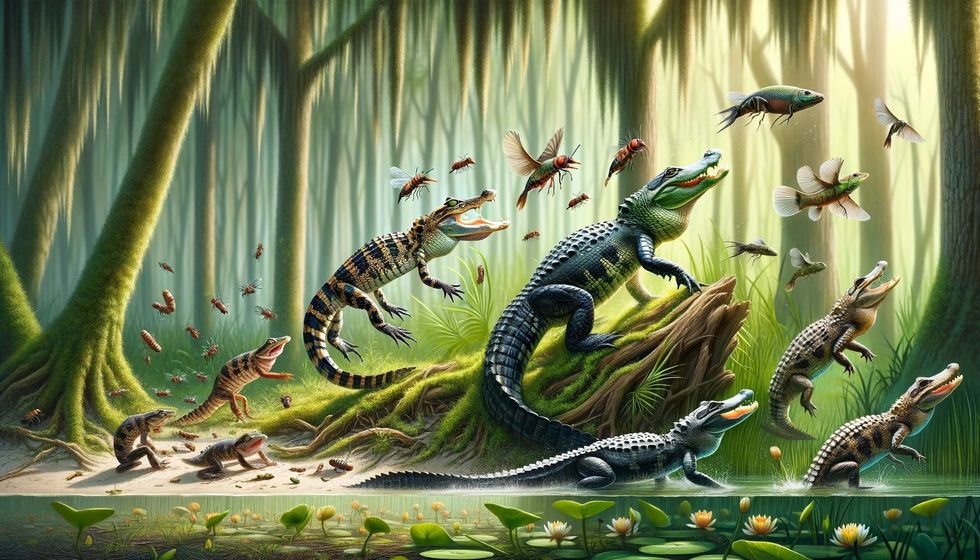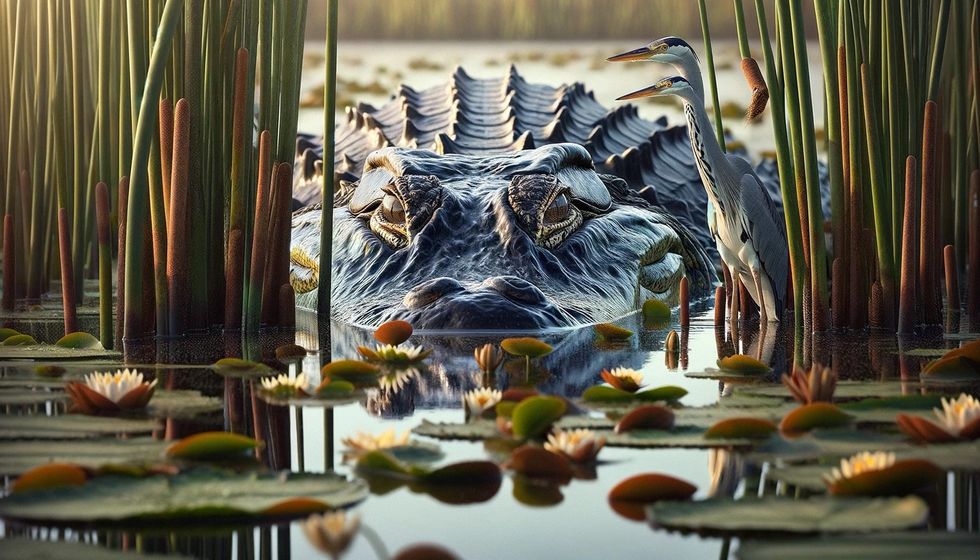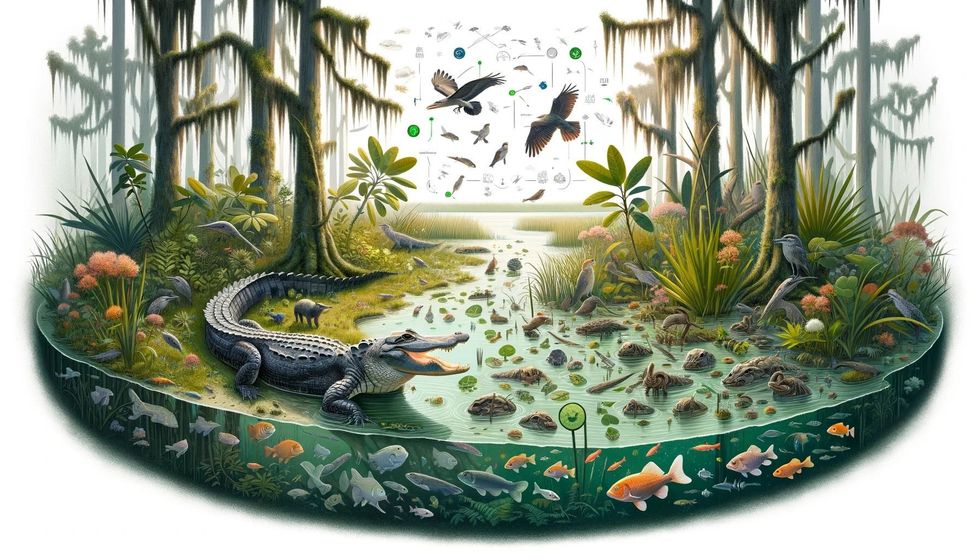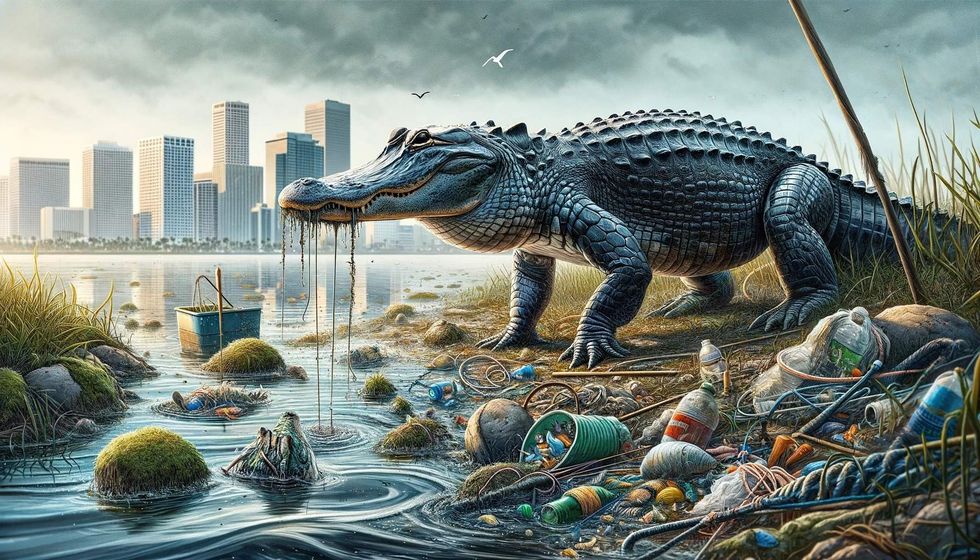Alligators are mighty hunters that sit at the top of their food chain. From the moment they hatch, their diets are full of variety, offering a glimpse into their life as they grow.
A baby alligator, for example, munches on insects, tadpoles, and little crustaceans, a good start for their growth. As they grow bigger, they start hunting down larger fish, frogs, and even small creatures that wander near the water's edge.
Once alligators reach adulthood, their menu gets even broader. They feast on big fish, birds, and land-dwellers like raccoons and deer.
They aren't picky; if they can catch it, they'll eat it. This includes other alligators and sometimes, even remains of dead animals which help their digestion. With strong jaws and keen hunting skills, they're important to places like the Florida Everglades, keeping animal populations in check and ecosystems healthy.
Alligators are great at hunting, often going on the prowl every two hours. They're especially sneaky when underwater, using special organs to sense movement and track down their prey. The American alligator is known for being an all-rounder when it comes to its meals, eating whatever it can find that's the right size.
The Chinese alligator has a similar diet, enjoying fish, snails, birds, and small land animals. The young ones start with bugs and small water critters. Both the American and Chinese alligators are incredibly important in their homes, making sure that the animal numbers stay balanced and their habitats remain healthy.
What do alligators eat in the wild? Unveiling the Diet of an Apex Predator

The American alligator, an iconic species of the southeastern United States, is a formidable predator in its natural habitat. These reptiles are known for their opportunistic feeding habits and play a crucial role in maintaining the ecological balance of their environments. As apex predators, they consume a wide range of prey, which varies with their size and age.
- When they're just hatched, baby alligators eat tiny creatures like insects, snails, and small fish. This is the food they need to grow.
- As they get older and bigger, these young gators start eating larger fish, frogs, small furry animals, and birds.
- Grown-up alligators aren't picky, they'll go for just about any animal they can catch, including fish, turtles, birds, raccoons, and deer.
- Alligators have really strong jaws that can break a turtle's shell and sharp teeth that help them hold on to their food.
- If an alligator catches something big, it will usually pull it underwater to drown it, making it easier to eat.
- They have a neat trick called a glottis that lets them swallow their food even when they're underwater.
- Most of the time, alligators hunt at night. They're good at sneaking up on their dinner in the dark.
- Alligators will also eat animals that are already dead if they find them.
- They are a big deal in their homes, the lakes, and swamps because they help keep the number of other animals in balance.
- It's not okay to feed wild alligators because it can make them start to think of people as a food source, which can be dangerous.
How Do Alligators' Feeding Habits Develop from Hatchlings to Adults?

Alligators are opportunistic apex predators that consume a wide variety of prey depending on their size and habitat. As they grow from vulnerable hatchlings to formidable adults, their diet undergoes a fascinating transformation.
While young alligators primarily feed on small, easily accessible prey like insects and crustaceans, adults expand their menu to include larger fish, birds, and mammals. The dietary habits of alligators play a crucial role in maintaining the balance of their ecosystems.
- Baby alligators, when they first hatch, are tiny, only about 0.5-0.6 ft (6-8 in) long. They start off by eating insects, tadpoles, and small crustaceans which help them grow.
- As they get bigger, young alligators start to eat minnows, frogs, small birds, and mammals. They gradually begin to catch anything they can overcome.
- Fully grown alligators have quite a varied menu. They eat big fish, birds, turtles, snakes, and mammals like raccoons and deer. They'll even eat smaller alligators if they can.
- The male alligators usually grow bigger than the females, which means they can go after bigger animals for food.
- Alligators are most active when temperatures are between 82-92°F (28-33°C) and stop feeding when the temperature drops below 70°F (21°C).
- American alligators are opportunistic feeders, and their diet largely depends on the abundance and accessibility of prey species in their habitat.
- In the Florida Everglades, American alligators have been observed preying on invasive Burmese pythons, potentially helping to control their populations and prevent them from spreading further north.
- Sometimes, alligators eat pets like dogs and cats, but most of the time, they stick to wild animals and those that don't have a home.
- It's rare, but alligators have been known to catch bigger mammals, like bobcats, panthers, and bears, usually when these animals are near water.
- Alligators are important for their homes, like swamps and rivers. They keep the number of other animals in check and make gator holes, which are spots that give other animals a place to stay and find water, especially when it's dry.
Fascinating Techniques Alligators Use to Hunt and Feed

Alligators are highly efficient predators, with a range of fascinating techniques that allow them to hunt and feed successfully in their aquatic habitats. As apex predators, they play a crucial role in maintaining the balance of their ecosystems. Here are some amazing facts about alligators' hunting and feeding behaviors.
- Adult alligators have a mouth full of teeth, around 74-80 at a time. These teeth have different shapes for different jobs. The big, sharp teeth help them catch slippery prey like fish, and the smaller, round ones crush tough shells of creatures like turtles.
- Alligators can grow new teeth throughout their life. Under each tooth, there's another one waiting to come in if the first one falls out. This can happen up to 50 times as an alligator gets older.
- Alligators have really strong tails that help them zoom through the water and snag their prey by surprise.
- When alligators bite, they know exactly how hard to clamp down. They can break the bones of medium-sized animals or be gentle enough to not hurt their babies.
- These predators also know how to trick nesting birds. They make small pools of water to lure the birds in, showing that they have clever hunting tricks.
- Alligators have sensitive vibration sensors on their skin, allowing them to detect even the slightest movements in their surroundings and react accordingly.
- Since alligators are cold-blooded and their bodies work slowly, they don't have to eat much. Usually, just once a week is enough for them.
- Alligators are one of the few reptiles that demonstrate parental care. Female alligators protect their young from predators and may even provide food for them during the first few months of their lives.
The Alligator's Role in the Ecosystem: The Importance of Their Diet

The American alligator (Alligator mississippiensis) is a keystone species that plays a crucial role in maintaining the health and balance of its ecosystem. As an apex predator, the alligator's dietary habits have a significant impact on the populations of various species within its habitat.
- As apex predators, alligators control populations of smaller, potentially overabundant species, such as raccoons and nutria, which can have negative effects on the ecosystem if left unchecked.
- By consuming a variety of prey, alligators help maintain the biodiversity of their habitat, preventing any single species from becoming too dominant.
- Many other animals, such as fish, turtles, and wading birds, depend on the alligator holes for habitat and food, especially during dry periods.
- Alligators help keep areas of open water free of invading vegetation as they move between gator holes and nesting mounds.
- The nesting mounds created by alligators provide nesting and feeding sites for various bird species, such as herons and egrets.
- By consuming large numbers of gar, a predatory fish, alligators help maintain populations of game fish like bass and bream.
- The American alligator is considered a keystone species due to its significant ecological role in maintaining the structure and function of its natural ecosystems.
The Impact of Human Interaction on Alligators' Dietary Patterns

Human activities have significantly influenced the dietary patterns of alligators, both directly and indirectly. As human populations continue to grow and encroach upon alligator habitats, these apex predators are forced to adapt to changing environments and food sources.
- Alligators living on golf courses have different dietary patterns compared to those in natural habitats due to changes in prey availability and exposure to human-made chemicals.
- Alligators on golf courses have been found to consume unusual items like canned corn, cats, fishing lures, and even cheeseburgers with fries.
- Habitat loss has impacted Chinese alligator populations, altering their natural feeding habits and forcing them to adapt to new food sources.
- Human activities like swamp airboat adventures can provide educational value by allowing visitors to observe alligator feeding habits and their ecological importance firsthand.
- Conservation efforts aim to maintain alligator populations by ensuring their diets consist of natural prey, allowing them to thrive in the wild.
- As human populations increase in Florida, alligator attacks have risen from an average of one every three years between 1988 and 1999 to about seven per year between 2000 and 2016.
FAQs
What do alligators typically eat?
Alligators have a diverse diet that changes as they grow. Young alligators, also known as hatchlings, primarily feed on small prey such as insects, snails, and fish.
As they mature, their diet expands to include larger fish, frogs, and small mammals. Adult alligators are capable of taking down even larger prey, including birds, turtles, and larger mammals like raccoons and deer. They are opportunistic feeders and will consume almost anything they can catch within their aquatic habitats.
How do alligators hunt their prey?
Alligators are nocturnal hunters that utilize a blend of stealth and power to capture their prey. They have specialized abilities to detect vibrations in the water, which aids them in locating prey. Using their strong tails for propulsion, they can launch sudden attacks on their targets.
Alligators are known for their powerful jaws, capable of exerting massive pressure to capture and crush their prey. They employ tactics such as creating small pools to attract birds and have strategies for subduing larger prey by dragging it underwater.
Are alligators dangerous to humans?
While alligators possess the potential to be dangerous due to their size, strength, and predatory instincts, attacks on humans are relatively rare. Alligators generally avoid human contact and are more likely to flee than attack.
However, feeding wild alligators can cause them to lose their natural fear of humans, potentially increasing the risk of an attack. It is crucial to maintain a respectful distance from alligators and adhere to local guidelines when in their habitats to minimize risks. Feeding alligators is illegal in many areas due to the dangers it poses.
Do alligators often attack humans? What should you do if it happens?
Alligator attacks on humans are relatively rare, especially when considering the large populations of alligators in areas like Florida. Alligators generally do not view humans as prey, and most encounters do not lead to attacks.
However, certain behaviors can increase the risk of an attack, such as feeding alligators, which can cause them to associate humans with food and lose their natural wariness.
If an alligator does attack, it is crucial to fight back, focusing on the alligator's most sensitive areas like the eyes and nose. Running away in a straight line is recommended if you are on land because alligators are fast over short distances but cannot maintain their speed over longer stretches.
Alligators are powerful predators and crucial contributors to their ecosystems. Ensuring their survival requires maintaining a respectful distance and allowing them to exhibit natural behaviors, whether they are observed from an airboat or the shoreline. These formidable reptiles symbolize the wild beauty of America's wildlife and underscore the importance of preserving the balance of nature.
Related Articles Around the Web

